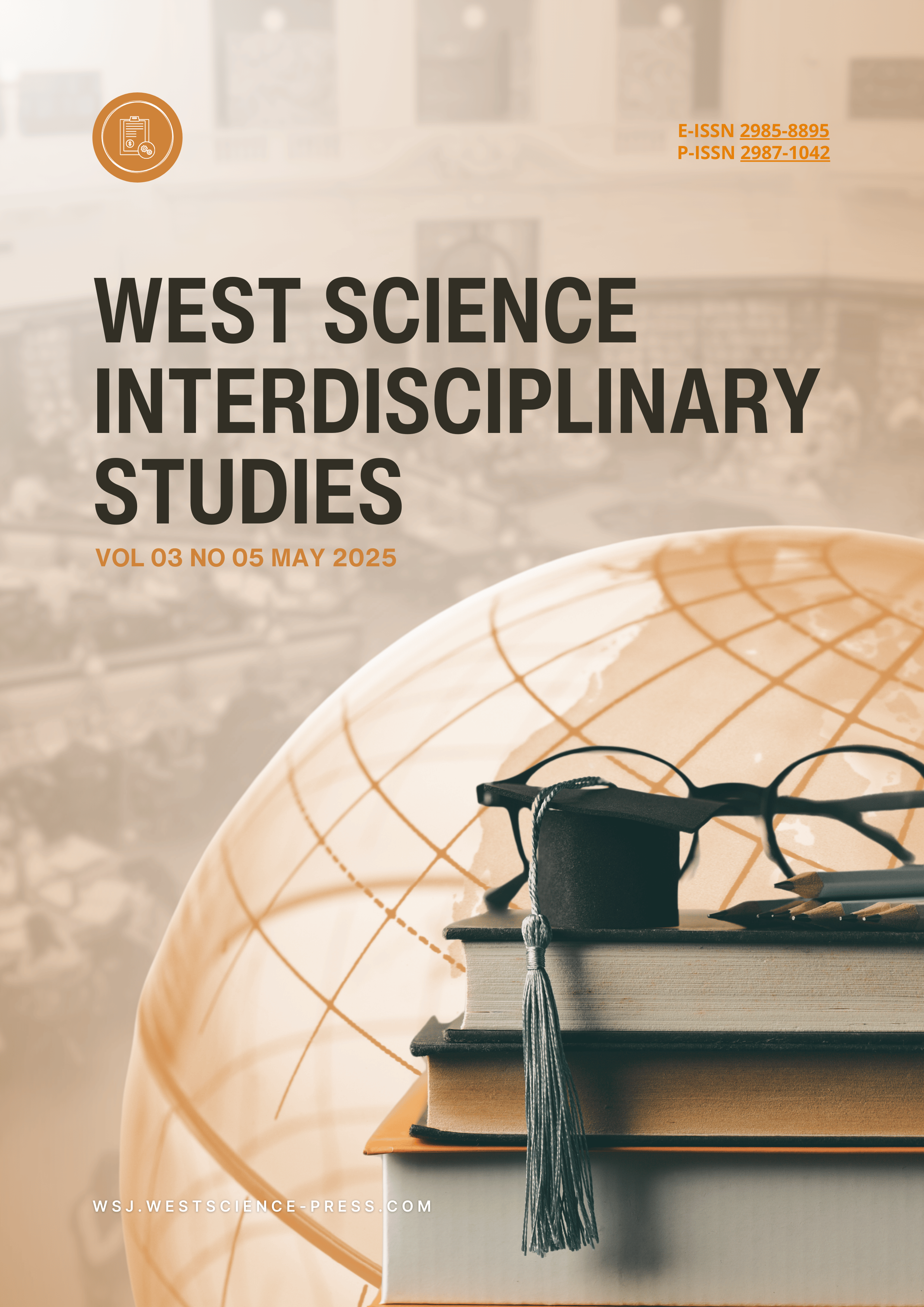Greenwashing vs Transparency: A Bibliometric Perspective
DOI:
https://doi.org/10.58812/wsis.v3i05.1912Keywords:
Greenwashing, Transparency, Sustainability Reporting, ESG, Bibliometric AnalysisAbstract
Greenwashing and transparency have emerged as two competing yet interconnected paradigms in the discourse on corporate sustainability. While greenwashing represents the manipulation or exaggeration of environmental performance, transparency reflects a firm’s commitment to honest, verifiable disclosure. This study employs a bibliometric analysis using VOSviewer to map the intellectual structure, thematic evolution, and collaborative patterns in the academic literature related to these two concepts. Based on a curated dataset from the Scopus database covering publications from 2000 to 2024, the analysis applies co-authorship, citation, co-word, and country collaboration techniques to uncover key contributors, emerging topics, and research gaps. Findings reveal that greenwashing remains a dominant theme, deeply embedded in literature on ESG, accountability, and sustainability reporting, while transparency is increasingly linked to digital technologies and financial instruments aimed at ensuring reporting credibility. Thematic clusters show evolving interest in areas such as green finance, blockchain, and supply chain transparency. Author and institutional networks reflect growing international collaboration, though notable disparities exist in geographic representation. This study contributes to a clearer understanding of the academic field and provides a foundation for future interdisciplinary research aimed at combating greenwashing and promoting transparent corporate sustainability practices.
References
[1] Q. Chen and Y. Duan, “Impact of information disclosure on global supply chain greenwashing: Is more information transparency always better?,” Transp. Res. Part E Logist. Transp. Rev., vol. 178, p. 103288, 2023.
[2] G. Kaner, “Greenwashing: How difficult it is to be transparent to the consumer—H&M case study,” Green Mark. Emerg. Mark. Strateg. Oper. Perspect., pp. 203–226, 2021.
[3] C. Bhagat, “Greenwashing vs. genuine efforts: The role of transparent communication in building corporate credibility,” J. Law Futur. Secur., vol. 1, no. 2, pp. 51–62, 2024.
[4] M. Alyahia, A. M. S. Azazz, S. Fayyad, I. A. Elshaer, and A. A. A. Mohammad, “Greenwashing behavior in hotels industry: The role of green transparency and green authenticity,” Sustainability, vol. 16, no. 3, p. 1050, 2024.
[5] J. Dempere, E. Alamash, and P. Mattos, “Unveiling the truth: greenwashing in sustainable finance,” Front. Sustain., vol. 5, p. 1362051, 2024.
[6] O. K. Reum and K. L. Aunet, “Sustainability reporting quality of growth companies versus value companies; greenwashing or transparency?” NTNU, 2022.
[7] G. Li, A. Homayounfard, and M. A. A. Ali, “Exploring the Influence of Green Transparency Improvement on the Trust Repair after Greenwashing,” J. Emerg. Trends Mark. Manag., vol. 1, no. 1, pp. 194–206, 2020.
[8] Z. Xie, Y. Liu, Y. Liu, and L. Xu, “Unveiling greenwashing dynamics: exploring the nexus between transparent corporate practices, employee perspectives, and ethical leadership impact,” Environ. Dev. Sustain., pp. 1–25, 2024.
[9] F. Baldassarre and R. Campo, “Transparency as the foundation of sustainable marketing: the environmental communication and the greenwashing risks,” in XV International Marketing Trends Conference, 2016.
[10] C. Marquis, M. W. Toffel, and Y. Zhou, “Scrutiny, norms, and selective disclosure: A global study of greenwashing,” Organ. Sci., vol. 27, no. 2, pp. 483–504, 2016.
[11] Y. Wu, K. Zhang, and J. Xie, “Bad greenwashing, good greenwashing: Corporate social responsibility and information transparency,” Manage. Sci., vol. 66, no. 7, pp. 3095–3112, 2020.
[12] F. He, C. Ding, W. Yue, and G. Liu, “ESG performance and corporate risk-taking: Evidence from China,” Int. Rev. Financ. Anal., vol. 87, p. 102550, 2023.
[13] A. A. Lashitew, “Corporate uptake of the Sustainable Development Goals: Mere greenwashing or an advent of institutional change?,” J. Int. Bus. Policy, vol. 4, no. 1, pp. 184–200, 2021.
[14] M. Liu, X. Luo, and W.-Z. Lu, “Public perceptions of environmental, social, and governance (ESG) based on social media data: Evidence from China,” J. Clean. Prod., vol. 387, p. 135840, 2023.
[15] N. Nemes et al., “An integrated framework to assess greenwashing,” Sustainability, vol. 14, no. 8, p. 4431, 2022.
[16] S. U. Rahman and B. Nguyen‐Viet, “Towards sustainable development: Coupling green marketing strategies and consumer perceptions in addressing greenwashing,” Bus. Strateg. Environ., vol. 32, no. 4, pp. 2420–2433, 2023.
[17] D. Satola, M. Balouktsi, T. Lützkendorf, A. H. Wiberg, and A. Gustavsen, “How to define (net) zero greenhouse gas emissions buildings: The results of an international survey as part of IEA EBC annex 72,” Build. Environ., vol. 192, p. 107619, 2021.
[18] A. Nygaard and R. Silkoset, “Sustainable development and greenwashing: How blockchain technology information can empower green consumers,” Bus. Strateg. Environ., vol. 32, no. 6, pp. 3801–3813, 2023.
[19] C. S. De Silva Lokuwaduge and K. M. De Silva, “ESG risk disclosure and the risk of green washing,” Australas. Accounting, Bus. Financ. J., vol. 16, no. 1, pp. 146–159, 2022.
[20] C. Forliano, E. Battisti, P. De Bernardi, and T. Kliestik, “Mapping the greenwashing research landscape: a theoretical and field analysis,” Rev. Manag. Sci., pp. 1–50, 2025.
[21] R. Reck, A. C. Castagna, S. Shuqair, and D. C. Pinto, “The transparency paradox: When transparency cues helps or backfires for brands?,” J. Clean. Prod., vol. 372, p. 133381, 2022.
[22] S. Kapitan, “Credibility vs. transparency in green marketing,” Routledge Companion to Mark. Soc., pp. 223–237, 2022.
Downloads
Published
Issue
Section
License
Copyright (c) 2025 Loso Judijanto, Nurganda Siregar, Rani Eka Arini

This work is licensed under a Creative Commons Attribution-ShareAlike 4.0 International License.
























 Instagram
Instagram 